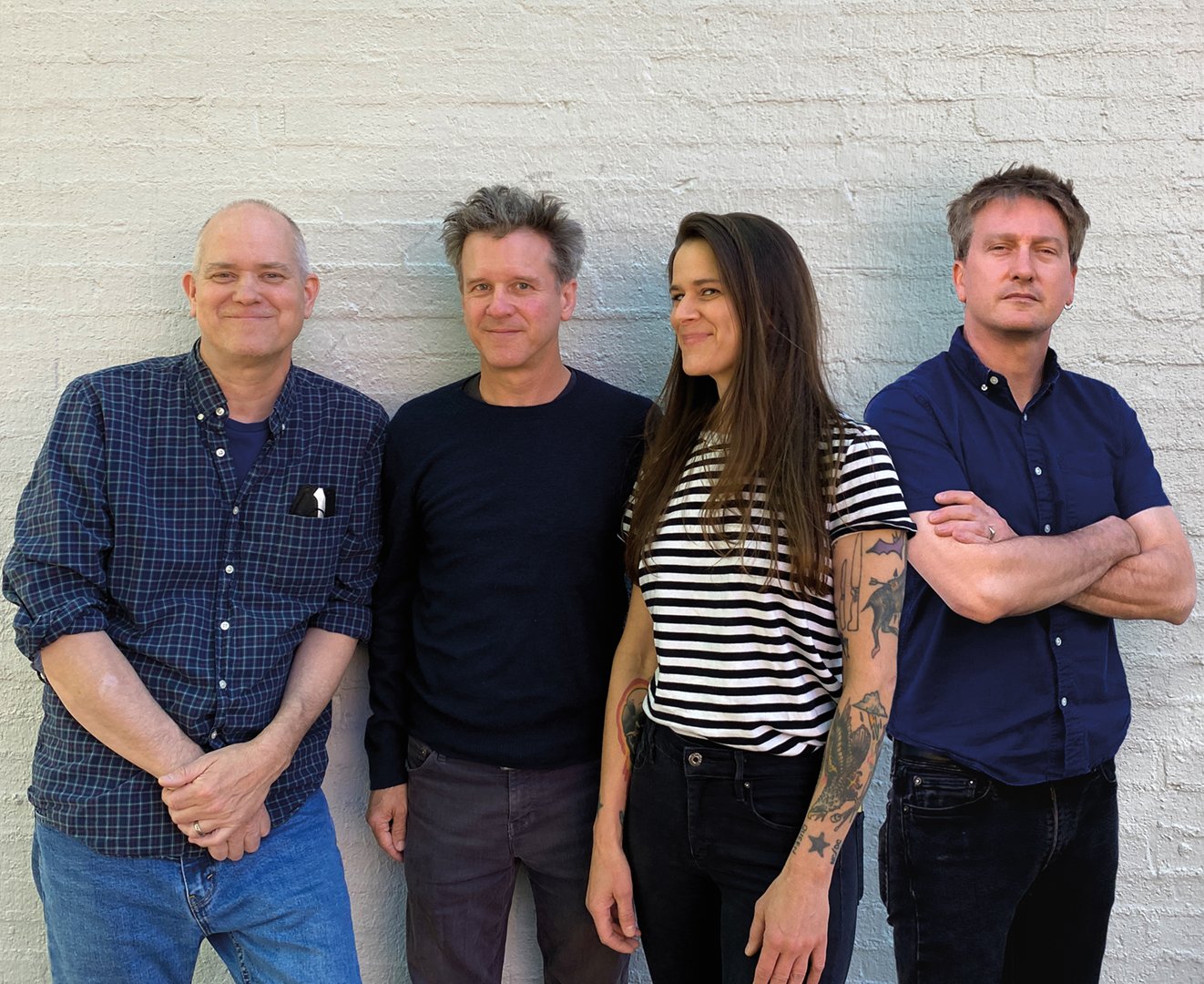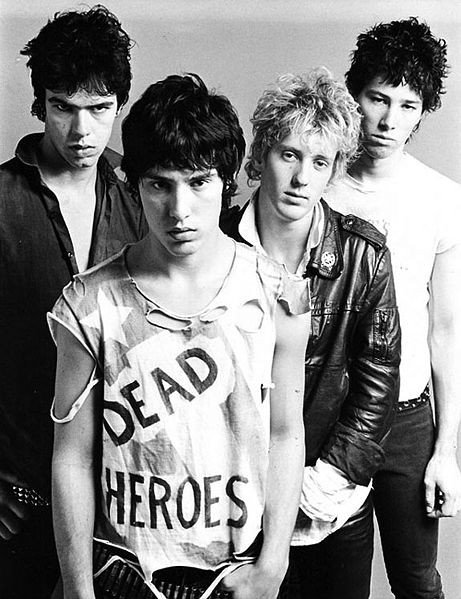Superchunk Matures More than it Ages

Pre-Laura King Superchunk (Mac McCaughan second from left)
The indie rock pioneers have figured out how to be their age in underground rock ‘n’ roll.
Superchunk has never over-served New Orleans. By the time they first played here in the early ‘90s, they had already retired their breakthrough song, “Slack Motherfucker,” but dug it out one last time for an audience that had never heard it live. Singer Mac McCaughan is amazed and feels a little bad that Superchunk hasn’t played here in 11 years, but he’s entertained by the fact that when Superchunk plays the Toulouse Theatre on Wednesday, it will be their fourth time in the venue, almost every time with a different name.
“It was the Shim Sham, and then it was One Eyed Jacks—we played there a couple of times—and now it’s the Toulouse Theatre,” McCaughan says.
“We’ve had some great shows in New Orleans. I had a really magical Portastatic show at the Mermaid Lounge. That was a super memorable night. It was past the Warehouse District, right? And It had, like, garage doors open to the outdoors. That was not like any other club in America.”
Thirty-five years into his career, McCaughan has toured enough between Superchunk and Portastatic to recognize changes in cities’ club scenes. He’s been at it long enough to have a grown daughter who’s a senior at Tulane. “She asked, Dad, are you going to play here before I graduate?”
The band tours in shorter bursts these days, two or so weeks at a time. There was a time when they rolled around the country from dive bar to college town to indie venue well past the point of good hygiene, but now two to three weeks is the sweet spot. McCaughan thinks they’d probably enjoy longer runs, but no one wants to be away from their families and lives for that long. Touring in shorter bursts means going to the regions where they can cram in the most shows, which tends to mean the east and west coasts. Midwestern cities often get missed, and so do southern ones like New Orleans.
Superchunk has experienced the fate of many indie bands from the ‘90s. If they’re good, they go from playing for college students to playing for their own college-age kids—surrounded, of course, by the band’s older fans. From the outset, Superchunk embodied indie, starting Merge Records to put out music by them and likeminded bands. Musically, you couldn’t imagine Superchunk getting signed to a major label like Nirvana or Screaming Trees or Soundgarden. The surging, hardcore energy, unpredictable pop hooks, and McCaughan’s high yelp embodied a compelling excitement, but it’s the kind of pure strain that had never been a mass market flavor. The years have made them more capable musicians and expanded their musical horizons, but earlier this year they released the single “Everybody Dies” and it could have come out of that first decade. Squalling guitars and fragmented guitar lines busily lead to a chorus that comes out of nowhere but sounds like the only place the song could go as McCaughan sings, “Everybody dies, everybody dies.” It’s a hard truth that sounds freeing when sung at a punk tempo by McCaughan in his upper register.
“We aren’t just losing legends from older generations — Pharoah Sanders or Toots Hibbert or Kidd Jordan or Tina Turner — but musicians we think of as peers and friends; people we have toured with and recorded with and shared beers with all over the world,” McCaughan said in statement to accompany its release. “It means of course we’re getting older, and while we know from an early age that yes, everybody dies, it doesn’t make these departures any less shocking.”
It’s a song he probably wouldn’t have written 20 or 30 years, he thinks. “I don’t think anything was off the table, but when you’re 23 some things just aren’t at the top of mind.”
The single came about for prosaic reasons. Superchunk and Merge are celebrating their 35th anniversaries and they wanted something new to commemorate the moment. They changed drummers and wanted something with the new one, Laura King, on it. They’re not in a rush to make a new album because they don’t have to be. They used to need new songs to make a new album so that they could tour and earn money, but they’ve reached a point where their finances are more stable than that. Those songs were once vehicles to build their reputation and audience, but that work has been done. Thirty-five years in, Superchunk’s audience has got as big as it will get. Some older fans cycle out but some new young fans discover them.
Talking about younger fans reminds McCaughan of his own experience with parents who were Stones fans. They loved Exile on Main Street so he did too, but he was 11 or 12 when Emotional Rescue came out and he seized on it as his Stones album. It was the first of their records that he experienced in real time, so he had a primary relationship with it that wasn’t mediated by his parents. He wants new fans to still experience Superchunk in real time and not as a cultural archaeology project.
“It’s cool to have something new coming out for [young fans] now,” he says.
Superchunk cut a single because they weren’t ready to do more. “It’s not the same kind of pressure,” McCaughan says of the impulse to record. “The only pressure comes from us to make a great record. If we’re going to make a new album, it has to be great. Otherwise, what’s the point?” People aren’t waiting for a new Superchunk record the way they once did because “there’s plenty out there already. It’s gotta be worth hearing,” McCaughan says. That approach has worked; critic Robert Christgau admired the band more than he liked its albums for years, but he graded each of their last four albums of new music an A- or an A.
A lot of Superchunk’s life now serves its history. Three of its last four releases have mined their extensive catalogue for singles, B-sides, acoustic versions, strays and whatnot. They’re on tour celebrating the 30th anniversary of one of their most popular albums, 1994’s Foolish, and it’s easy to imagine all that looking back to be painful, like going through a high school yearbook and seeing your history of bad haircuts. McCaughan gives himself slack. He accepts the albums as moments in time, and while some artists with long musical histories wince at lines they once thought good enough, he mainly hears technical touches he wishes he could address.
“Our ambitions ran up against our budgets,” he says. “We recorded and mixed No Pocky for Kitty in three nights. We recorded Foolish in, like, three days maybe and mixed it in another few days.” In that rush, he hears vocals that he would like to have taken a few more passes at or technical issues he’d love to correct, but not enough to do anything about them. The versions that are out are the versions fans fell in love with, so there’s no money in a re-recorded Foolish (Superchunk’s version).
At the time, they lived in a musical and social circle with the bands they played with on the road. McCaughan can hear the influence of Unrest and Stereolab on Foolish, which they recorded at Pachyderm Studios in Minnesota with Brian Paulson (Slint, Wilco, and Son Volt) at Unrest’s suggestion. “In your mind, you’re thinking about what’s influenced you or what you’re listening to and you think, I want to make a record like what they’re doing.” McCaughan says. “But then when it gets filtered through what you actually know how to do, it sounds totally different.”
Foolish opens with “Like a Fool,” which was a deliberate change of pace for the band with clean guitars and slower tempos that gradually build toward their usual intensity.
“We probably thought that ‘Like a Fool’ was like a Slint song for us,” McCaughan says. “No one listening that would say it sounds like Slint.”
Going back to Foolish isn’t a chore for McCaughan. It has a lot of fan favorite songs on it including “Driveway to Driveway,” and McCaughan can hear progress in it. “It feels like a whole album, more cohesive,” he says. They’re not playing the entire album on the tour, but they’re featuring it heavily.
Accommodating Foolish and the rest of the band’s lengthy catalogue in a set is one of the joys for McCaughan. They want to choose songs that are fun for them to play, but they want to get to some of the fan favorites because there’s nothing like “the energy you feel in the room when you start ‘Driveway to Driveway’ or something,” he says. Since it will be nearing Halloween, Superchunk will likely play “There’s a Ghost” in honor of the season, and they try to come up with something that will surprise the diehard fans that have seen most of their appearances in a city. That impulse inevitably leads McCaughan to consider songs they have rarely played since their albums came out, ones that in some cases he has forgotten over the years. When he can’t shake the memory loose, “I will try to find live videos of us playing so I can see what I was doing on a song,” he says. “Where is my hand?” He really hopes that jogs the memory because some songs involve tunings that videos can’t reveal.
These days, getting ready to go on tour is a fairly prosaic activity. He has a wife, Merge (which he co-founded with bandmate Laura Ballance), and a 17-year-old son, so there are domestic things he has to deal with. They’re selling a limited edition split single while on tour with the opening act Quivers, and he has to hand-number those. He’s politically active and spent the morning writing postcards to voters. “All these little things you keep thinking of,” he says.
The upside of going on tour these days is that he can partially disconnect from the anxiety of the upcoming election. “It would have been more of a distraction 30 years ago when we couldn’t be looking at our phones all day regardless of where we are,” McCaughan says. “It’s hard to turn off the news.”
Creator of My Spilt Milk and its spin-off Christmas music website and podcast, TwelveSongsOfChristmas.com.






